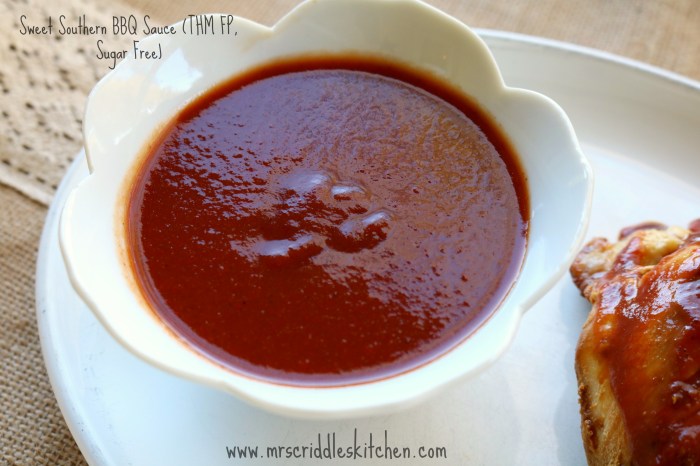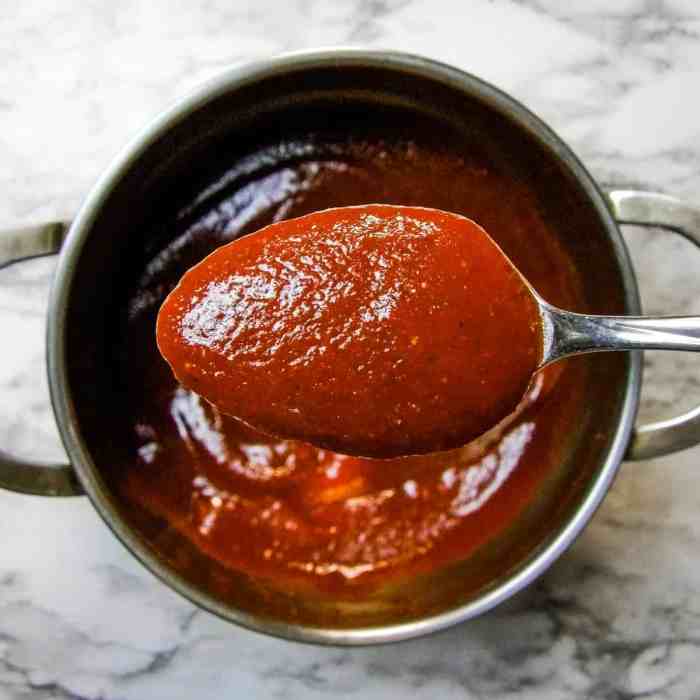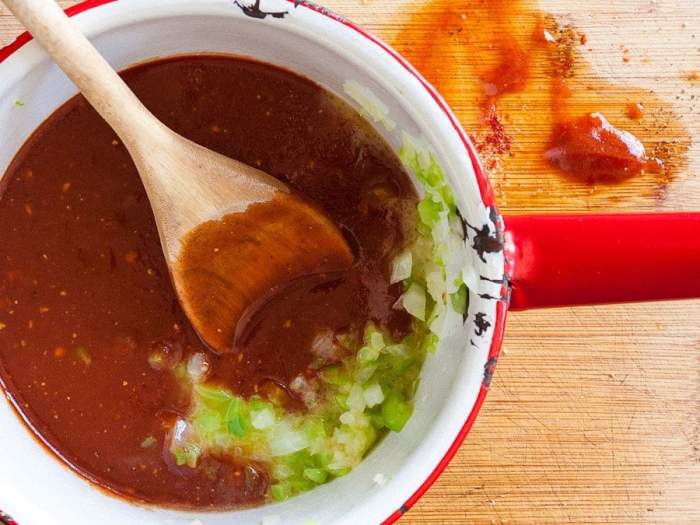Southern BBQ Sauce Recipes A Flavorful Guide
Defining Southern BBQ Sauce Styles
Southern bbq sauce recipes – Southern BBQ sauce boasts a rich tapestry of regional variations, each with its unique flavor profile. Understanding these differences is key to appreciating the diversity of this culinary tradition. The primary distinctions lie in the base ingredient – vinegar, mustard, or tomato – which significantly impacts the overall taste and texture. Regional variations within each style further enrich this complexity, reflecting local ingredients and culinary preferences.
Key Characteristics of Southern BBQ Sauce Styles
Three prominent styles stand out: vinegar-based, mustard-based, and tomato-based. Vinegar-based sauces, prevalent in the Carolinas, are tangy and thin, relying on vinegar’s sharp acidity for their defining characteristic. Mustard-based sauces, common in South Carolina, feature a distinctive mustard flavor, often complemented by vinegar and spices. Tomato-based sauces, popular in the Midwest and Texas, are typically sweeter and thicker, showcasing the richness of tomatoes and a blend of spices.
Regional Variations in Southern BBQ Sauce Styles
Regional variations within each style are significant. For instance, Carolina vinegar sauces can range from the intensely vinegary styles of Eastern North Carolina to the slightly sweeter versions found in South Carolina. Similarly, mustard-based sauces can vary in the type of mustard used, with some featuring a stronger yellow mustard flavor while others incorporate a smoother, Dijon-like mustard. Tomato-based sauces can differ widely in sweetness and spice level, reflecting the preferences of different regions.
Comparative Table of Southern BBQ Sauce Styles
| Style Name | Primary Base | Key Ingredients | Typical Regional Origin |
|---|---|---|---|
| Carolina Vinegar | Vinegar | Vinegar, pepper, salt, sometimes a touch of sugar | North and South Carolina |
| South Carolina Mustard | Mustard | Mustard, vinegar, brown sugar, spices | South Carolina |
| Kansas City Sweet | Tomato | Tomato paste, brown sugar, molasses, spices | Kansas City, Missouri |
Core Ingredients and Their Roles
The distinctive flavors of Southern BBQ sauce are achieved through a careful balance of core ingredients. Each ingredient plays a vital role in shaping the final taste and texture.
Importance of Core Ingredients
- Tomato Paste: Provides body, sweetness, and umami depth, especially in tomato-based sauces.
- Vinegar: Offers acidity and tanginess, balancing sweetness and enhancing the overall flavor profile. Different types of vinegar contribute unique nuances. Apple cider vinegar lends a fruity sweetness, while white wine vinegar provides a sharper, more acidic taste.
- Brown Sugar: Adds sweetness and helps to balance the acidity of the vinegar. Molasses can also contribute a deeper, richer sweetness.
- Spices: Create depth and complexity. The specific blend of spices varies by region and recipe, but common choices include paprika, black pepper, cayenne pepper, garlic powder, and onion powder.
The Role of Spices in Creating Depth and Complexity
- Paprika adds a smoky sweetness and vibrant color.
- Black pepper provides a subtle heat and enhances the overall flavor.
- Cayenne pepper introduces a level of heat, ranging from mild to intense depending on the amount used.
- Garlic and onion powder contribute savory notes and enhance the other flavors.
Recipe Variations and Adaptations: Southern Bbq Sauce Recipes
The beauty of Southern BBQ sauce lies in its adaptability. Numerous variations exist, each showcasing regional preferences and unique flavor combinations. Below are three distinct recipes representing different styles, along with a gluten-free adaptation and a recipe featuring unique ingredients.
Three Unique Southern BBQ Sauce Recipes
Recipes would be included here, detailing ingredients and instructions for a Carolina Vinegar, Memphis Dry Rub, and Kansas City Sweet style BBQ sauce. Each recipe would be clearly delineated and easy to follow.
Gluten-Free Southern BBQ Sauce Recipe

Source: mrscriddleskitchen.com
A recipe for a gluten-free version would be provided here, noting any substitutions made (e.g., using tamari instead of soy sauce, ensuring all other ingredients are naturally gluten-free).
Southern BBQ Sauce with Unique Ingredients
A recipe showcasing unexpected ingredients (e.g., a hint of chipotle powder, a splash of bourbon, or a touch of dark chocolate) while still maintaining the core essence of Southern BBQ sauce would be detailed here.
Cooking Methods and Techniques
Proper cooking techniques are crucial for achieving the desired texture and flavor in Southern BBQ sauce. Simmering, reducing, and thickening are key processes that influence the final product.
Simmering, Reducing, and Thickening, Southern bbq sauce recipes
Simmering gently melts the sugars and allows the flavors to meld. Reducing concentrates the flavors and thickens the sauce by evaporating moisture. Thickening agents like cornstarch or flour can be added to achieve the desired consistency. Controlling cooking time is essential to prevent burning and ensure a smooth, lump-free sauce.
Adjusting Consistency and Avoiding Lumps
To achieve a smooth sauce, it’s important to whisk continuously while adding thickening agents. A slow, steady addition prevents lumps from forming. If lumps do occur, strain the sauce through a fine-mesh sieve to achieve a perfectly smooth texture. Overcooking can lead to a burnt or overly thick sauce, so careful monitoring of the cooking process is crucial.
Serving Suggestions and Pairings

Source: ranchstylekitchen.com
Southern BBQ sauce’s versatility extends beyond its classic application on meats. Creative serving suggestions and thoughtful pairings elevate the culinary experience.
Creative Serving Suggestions
Use it as a glaze for roasted vegetables, such as carrots, sweet potatoes, or Brussels sprouts.
Drizzle it over grilled corn on the cob for a sweet and savory treat.
Southern BBQ sauce recipes often highlight the smoky sweetness of the region’s culinary heritage. However, the principles of balancing sweet, savory, and tangy flavors extend beyond BBQ; consider the vast world of sauces for stir fry recipes, like those found on this helpful site: sauces for stir fry recipes. Returning to our Southern roots, the same balanced approach is key to crafting a truly exceptional BBQ sauce.
Incorporate it into your favorite burger recipe for an added layer of flavor.
Ideal Food Pairings for Southern BBQ Sauce Styles
| Sauce Style | Ideal Meat Pairing | Ideal Side Dish Pairing | Flavor Profile Description |
|---|---|---|---|
| Carolina Vinegar | Pulled pork | Coleslaw | Tangy, sharp, and slightly sweet |
| South Carolina Mustard | Chicken | Potato salad | Savory, tangy, and subtly sweet |
| Kansas City Sweet | Ribs | Baked beans | Sweet, smoky, and savory |
Visual Representation of Textures and Colors

Source: toriavey.com
The visual appeal of Southern BBQ sauce is as important as its flavor. The ideal texture and color vary depending on the style, offering visual cues to its quality and proper cooking.
Ideal Texture and Color Descriptions
A Carolina vinegar sauce should have a thin, glossy consistency and a deep amber color. A South Carolina mustard sauce should be slightly thicker, with a rich, dark brown hue. A Kansas City sweet sauce should be thick and glossy, with a deep reddish-brown color. A properly cooked sauce will have a smooth, even consistency, free of lumps, with a noticeable sheen indicating proper reduction.
Key Questions Answered
Can I use store-bought BBQ sauce as a base?
While you can, it’s generally recommended to start from scratch for the best flavor control and understanding of the process. Store-bought sauces often contain added sugars and preservatives.
How long does homemade BBQ sauce last?
Properly stored in the refrigerator, homemade BBQ sauce can last for up to a week. For longer storage, consider freezing it in airtight containers.
What are some substitutes for brown sugar?
You can substitute brown sugar with molasses, maple syrup, or even honey, adjusting the amount depending on the sweetness level desired. Each will impart a slightly different flavor.
Can I make BBQ sauce without a stovetop?
While stovetop cooking allows for better control of the thickening process, you can make a simpler version by combining ingredients in a bowl and letting the flavors meld in the refrigerator for several hours.




















